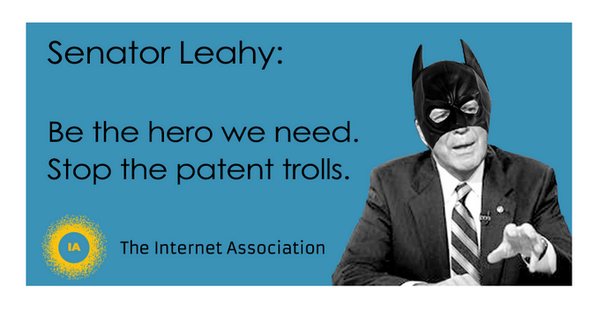Patent Trolls Rejoice! Reform Bill Likely Dead As Sponsoring Sen. Patrick Leahy Takes It Off Agenda


After the U.S. House of Representatives passed a patent reform bill in December 2013, many hoped that the Senate would soon respond in kind. But after stalling for several months, Senate patent reform efforts suffered a likely fatal blow today after Sen. Patrick Leahy (D-Vt.), chairman of the Senate Judiciary Committee, removed the patent bill he had sponsored from the committee's agenda.
"Very disappointing that patent reform efforts came to a halt with @SenatorLeahy's decision today," the R Street Institute, a D.C.-based think tank that has been following patent reform efforts, tweeted this afternoon.
In his announcement, Sen. Leahy cited "lack of sufficient support" as the reason for taking the bill off the committee's agenda.
We have been working for almost a year with countless stakeholders on legislation to address the problem of patent trolls who are misusing the patent system. This is a real problem facing businesses in Vermont and across the country.
Unfortunately, there has been no agreement on how to combat the scourge of patent trolls on our economy without burdening the companies and universities who rely on the patent system every day to protect their inventions. We have heard repeated concerns that the House-passed bill went beyond the scope of addressing patent trolls, and would have severe unintended consequences on legitimate patent holders who employ thousands of Americans.
I have said all along that we needed broad bipartisan support to get a bill through the Senate. Regrettably, competing companies on both sides of this issue refused to come to agreement on how to achieve that goal.
Leahy concluded that he hoped they were able to return to the issue next year, which sounds like the legislative equivalent of "I'll text you sometime."
The Senate patent reform bill wasn't lacking for popular support. Hundreds of companies—including tech giants such as Google and Microsoft—urged Senators to act on the bill, and 42 state and territorial attorneys general support it. The White House undertook its own (minor) patent reform efforts in February.
"I am surprised and disappointed that the Senate Democrat leadership is not willing to move forward on a bill that we've worked on so hard and were ready and expecting to mark up tomorrow," said Sen. Chuck Grassley (R-Iowa) in a statement. "We put in a good faith effort to get to this point, and it's too bad that the bill is being pulled from the agenda."
Editor's Note: As of February 29, 2024, commenting privileges on reason.com posts are limited to Reason Plus subscribers. Past commenters are grandfathered in for a temporary period. Subscribe here to preserve your ability to comment. Your Reason Plus subscription also gives you an ad-free version of reason.com, along with full access to the digital edition and archives of Reason magazine. We request that comments be civil and on-topic. We do not moderate or assume any responsibility for comments, which are owned by the readers who post them. Comments do not represent the views of reason.com or Reason Foundation. We reserve the right to delete any comment and ban commenters for any reason at any time. Comments may only be edited within 5 minutes of posting. Report abuses.
Please to post comments


I hate patent trolls as much as any, but it is generally a good idea when congress decide not to write new law.
Look at how well their amendments to copyright law have gone!
Maybe, but patent trolls are costing businesses--mostly totally innocent businesses--billions a year. I mean, I know our boom economy can afford to waste trillions and all, but it seems like something that needs reining in. After all, it's the law and the stupid behavior of the PTO and some courts that's created this mess.
I'm sure the millions that trial lawyers donate to Democrats had absolutely nothing to do with this.
^This^
The kiss of death for any first date.
If Leahy was involved, the legislation would have probably ended up strengthening patent trolling anyway.
That's my guess as well. Just like the affordable health care act.
I expect there's something logrolled into that bill that stifles freedom or kills baby ducklings or something.
No, the bill was a companion to the House bill. If introduced to match the House bill, it would have unambigiously made patent trolling much more difficult. In the process, it unavoidably would have made all patent claims more difficult, which upset some patent holders, especially universities.
He was attempting to craft a new compromise Manager's Amendment that the "Innovation Alliance," a group of universities and some patent-heavy companies, would accept, but was unable to do so. He refused to introduce the House bill as passed, even though that would have passed in a bipartisan vote-- albeit one with nearly all Republicans in favor, but perhaps somewhat less than half the Democrats.
The Senate Democrats have under Reid always played by their own "Hastert Rule," blocking bipartisan bills. They did the same thing on FAA reauthorization and Coburn's bill to decrease Essential Air Service subsidies. (Which got ~65 votes in favor on a test vote, but then got blocked by Reid because it was 45 Republicans and 20 Dems in favor, 35 Dems opposed.)
What was the senate bill supposed to do? My guess is that a big category of what Microsoft and Google consider patent trolling is not what most people think about.
The Senate bill matched the House one. It would have cut down what most people think of as patent trolling. It also would, as an unavoidable consequence, made it more difficult for more legitimate patent holders to recover damages. A common case of Type I vs. Type II errors. It was a move in the correct direction.
However, some large companies with a lot of patents, along with universities (who have lots of patents that they license, but few products) opposed the deal, as did the trial lawyers. Those groups, who are not generally considered trolls, personally felt that the possible damage to their (fairly legitimate) patent licensing revenue was too great a cost, especially since the negative patent trolling hasn't really affected them as much so far.